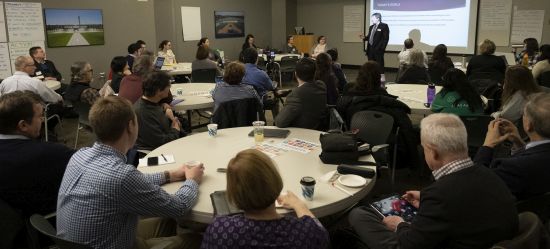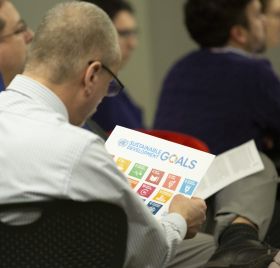Making a Greener U
New Climate Action and Sustainability Plan will clarify goals and outcomes
 |
|
Vice President for Finance and Administration Todd Foreman addresses the group at the kick-off for UAlbany's Climate Action and Sustainability Plan. A working plan is expected to be implemented by the end of the year. (Photos by Patrick Dodson) |
ALBANY, N.Y. (Feb. 28, 2019) — From reducing our carbon and waste footprints to educating the next generation of engaged stewards of the planet, UAlbany has plenty of reasons for going green.
Now, the University is pulling all those ideas together into a single Climate Action and Sustainability Plan that will not only set goals, but create guidelines for implementing them.
Last week the Office of Sustainability held a kick-off event to update the campus community on the University’s current state of sustainability, and to launch the four working committees that will be developing the Action Plan.
Vice President for Finance and Administration Todd Foreman opened the meeting, held in Empire Commons, by praising “this army, this community of people dedicated to the ideals of sustainability and the importance of sustainability in our campus community.”
 |
|
UAlbany's new plan will be aligned with SUNY, state and U.N. goals. |
Director of Sustainability Mary Ellen Mallia leads that army, with the help of interns, students, the University’s Sustainability Coordinators Committee and countless interested colleagues in staff, faculty and leadership roles. To formulate the plan, she also called in a couple of big guns – consultants Julia Weeks and Lisa Bjerke from GreenerU, a Watertown, Mass., firm that works with colleges and universities on sustainability, energy plans and ways to engage faculty, staff and students in achieving those goals.
“We’re creating a strategic plan for sustainability and we want it to be an inclusive community engagement process,” Mallia said. “We’re responding to the urgency for action, as indicated by our climate scientists. We have numerous ideas on how to be more sustainable, but we need a plan to aggregate these under our campus goals, and to prioritize actions.”
UAlbany is rated a Gold institution through STARS, the Sustainability Tracking and Assessment Rating System, and has been listed as a Green School by the Princeton Review. There are nine LEED-certified buildings on campus, a robust recycling program, and composting stations in the dining halls. And since 2005 the University has reduced carbon emissions 19 percent and waste sent to the landfill by 20 percent — despite an 8 percent increase in square-footage.
The new Climate Action and Sustainability Plan aims to improve on these gains and align with the key goals of the University’s Strategic Plan, the SUNY Chancellor’s sustainability goals, New York State Executive Orders and the U.N. Global Goals for Sustainable Development.
SUNY Chancellor Kristina Johnson has called the entire SUNY System to move toward zero-carbon electricity sources by retrofitting existing buildings and designing new buildings with net-zero carbon emissions. Gov. Cuomo’s goal is to have all state buildings carbon-free by 2040.
UAlbany’s plan is being drafted by four working groups, each concentrating on one aspect of the University: curriculum, operations, research and development, and engagement and planning. A draft of the plan is expected to be completed and submitted to President Rodríguez for review by this summer. After any needed refinement, the plan should be put into action by the end of 2019.
For more information and updates, visit the Office of Sustainability’s web page. You can watch a video of the launch event on the Green Scene Facebook page.
![]() For more news, subscribe to UAlbany's RSS headline feeds
For more news, subscribe to UAlbany's RSS headline feeds
A comprehensive public research university, the University at Albany-SUNY offers more than 120 undergraduate majors and minors and 125 master's, doctoral and graduate certificate programs. UAlbany is a leader among all New York State colleges and universities in such diverse fields as atmospheric and environmental sciences, business, education, public health,health sciences, criminal justice, emergency preparedness, engineering and applied sciences, informatics, public administration, social welfare and sociology, taught by an extensive roster of faculty experts. It also offers expanded academic and research opportunities for students through an affiliation with Albany Law School. With a curriculum enhanced by 600 study-abroad opportunities, UAlbany launches great careers.


